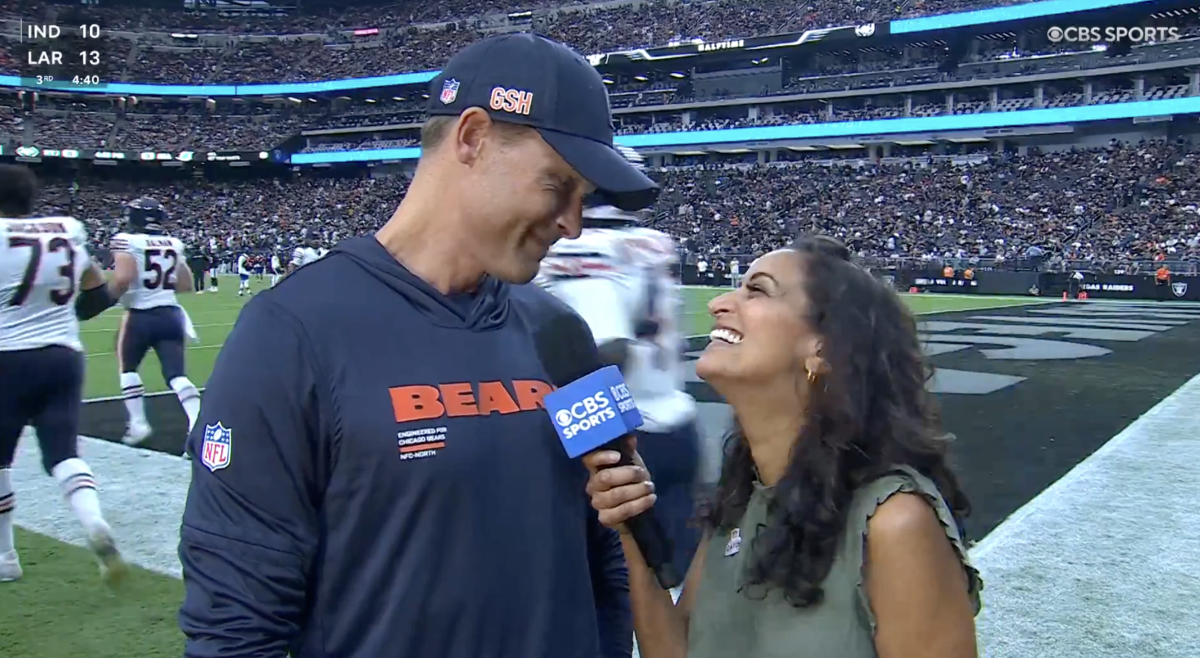Halftime interviews during NFL games rarely produce headline-worthy content. Often dismissed as “nothing burgers,” these brief exchanges between head coaches and sideline reporters tend to offer little beyond injury updates or generic observations. However, the Chicago Bears vs. Las Vegas Raiders game delivered an exception, igniting a debate across the NFL community. The focus? A terse exchange between Bears head coach Ben Johnson and CBS Sports sideline reporter Aditi Kinkhabwala.
This article delves into the details of the controversial interview, explores the reactions from fans and analysts alike, and examines the broader implications of sideline reporting in today’s NFL. Was Kinkhabwala’s question out of line, or was Johnson’s response unwarranted? Let’s break it down.
The Halftime Exchange: Johnson vs. Kinkhabwala
At halftime, with the Bears trailing the Raiders 14-9 and their offense struggling, Aditi Kinkhabwala posed a seemingly straightforward question to Ben Johnson: “Do you need to change what you’re doing?” Johnson’s curt response, “I don’t know, you think so?” followed by a somewhat dismissive, “We’re gonna be just fine,” immediately raised eyebrows. The exchange, brief as it was, quickly went viral, sparking a flurry of opinions across social media and sports news outlets.
The tension was palpable, and Johnson’s demeanor was interpreted by many as dismissive and even disrespectful. Kinkhabwala’s laughter after Johnson’s initial response further fueled the controversy. Was she mocking the coach, or was it simply an awkward attempt to diffuse the situation? The ambiguity of the moment is part of what made it so captivating.
The NFL Community Weighs In: Divided Opinions
The NFL world wasted no time dissecting the interview. Former coaches, analysts, and fans all offered their perspectives, creating a diverse range of opinions. Some, like former NFL head coach Jon Gruden, sided with Johnson, suggesting Kinkhabwala’s question was inappropriate and out of line. Gruden’s colorful remark about Johnson not slamming the microphone underscored the perceived audacity of the question.
“For Ben Johnson not to take that microphone and slam it on the ground, it’s a real credit to him,” Gruden stated, highlighting the intensity of the debate. However, others criticized Johnson’s handling of the situation, pointing to a perceived pattern of disrespectful behavior in his interviews. These critics argued that Johnson’s response was unprofessional and that he should have handled the question with more grace, regardless of his team’s performance.
Analysis of Kinkhabwala’s Question: Fair or Foul?
The crux of the debate centers on the fairness of Kinkhabwala’s question. Was it a legitimate inquiry aimed at understanding the coach’s strategy, or was it a loaded question designed to provoke a reaction? Sideline reporters often walk a tightrope, balancing the need to extract meaningful information with the risk of asking questions that coaches deem intrusive or critical.
Some argue that Kinkhabwala’s question was simply stating the obvious: the Bears’ offense was struggling, and a change in strategy seemed warranted. Others contend that the question was overly simplistic and failed to acknowledge the complexities of in-game adjustments. Moreover, the timing of the question – during a high-pressure halftime interview – may have contributed to Johnson’s defensive response.
The Role of Sideline Reporters in the Modern NFL
The incident raises broader questions about the role of sideline reporters in the modern NFL. These reporters are tasked with providing insights and updates from the field, often under challenging circumstances. They must navigate the pressures of live television, the demands of coaches and players, and the scrutiny of millions of viewers. The value of their contributions is often debated, with some questioning whether sideline interviews provide any real substance.
While some interviews yield valuable information, many are filled with clichés and platitudes. Coaches are often reluctant to reveal strategic details or offer critical assessments of their team’s performance. This dynamic can lead to awkward exchanges and ultimately undermine the purpose of sideline reporting. The challenge lies in finding a balance between entertainment and insightful analysis.
Lessons Learned and Moving Forward
The Ben Johnson-Aditi Kinkhabwala incident offers several key takeaways for both coaches and reporters. For coaches, it underscores the importance of maintaining composure and professionalism, even in the face of challenging questions. While frustration is understandable, a measured response can prevent unnecessary controversy and maintain a positive image. NFL coaches must remember to keep their cool and continue to be professional at all times, whether winning or losing.
For reporters, it highlights the need to be mindful of the context and timing of their questions. While probing inquiries are essential, sensitivity and respect are equally important. Building rapport with coaches and players can foster more open and honest communication, leading to more informative and engaging interviews. Knowing who you’re interviewing and their personality and character can also help reporters formulate a game plan of what to ask and what not to ask.
Conclusion: A Moment of Tension Reflects Broader Dynamics
The halftime exchange between Ben Johnson and Aditi Kinkhabwala was more than just a fleeting moment of tension. It reflected the complex dynamics between coaches, reporters, and the media in the high-stakes world of the NFL. The incident sparked a debate about the fairness of sideline reporting, the responsibilities of coaches, and the ever-present pressures of live television. As the NFL continues to evolve, it’s crucial for all parties involved to strive for professionalism, respect, and a shared commitment to delivering insightful and engaging content to fans. This commitment will ensure the most successful NFL product possible.

Leave a Reply